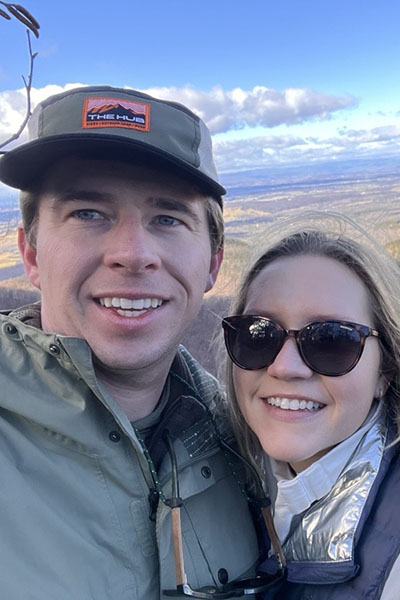July 18, 2025
from the Record, Spring 2025
GOOD NEIGHBOR
Apex Clean Energy
“The best conservation practices create an ecological benefit and a public benefit,” says Christopher Hawk ’16, senior development manager with Apex Clean Energy in Charlottesville, Virginia. At Apex, conservation doesn’t happen in a vacuum. It happens alongside economic development opportunities and energy innovation. Most importantly, though, it happens within the communities of the people, plants, and animals that live in an Apex project zone.
From implementing mitigation strategies to avoiding sensitive resources while helping landowners generate new income streams, creating new tax revenues for localities, and providing clean energy, Hawk says finding ways to be a good community member is one of his favorite parts of the job. Before electricity is ever produced by solar panels or wind turbines, Apex invests in the community by providing grants to local organizations that focus on creating safe and healthy communities, economic development, environmental sustainability, and promoting education. “Seeing a previously dilapidated park, to use an example from a current solar project in development, get fixed up and bring the joy of the outdoors to local kids is pretty fun stuff,” he says. “To be able to support initiatives like that and to show that we’re here to be long-term partners in the community is special.”
After graduating with a biology degree from H-SC, Hawk spent three years as an environmental consultant and then three years in land use and conservation before finding his “perfect fit” as a renewable energy developer. “We don’t live in a one energy kind of world,” Hawk says. “We need all energy forms, and I enjoy helping diversify America’s energy use portfolio by creating homegrown energy for local communities.”
An avid outdoorsman, Hawk is sensitive to maintaining aesthetic, functional, and accessible public lands and sightlines while producing clean energy. “The beauty of conservation is when protection of resources aligns with the public being able to use those resources for their enjoyment,” Hawk explains. “It’s not just about having Yellowstone National Park that tourists flock to. It’s also about having a local pocket park or a nearby trail that you can literally walk to from your house. When conservation meets public use near where you live. That’s a pretty incredible thing.”


